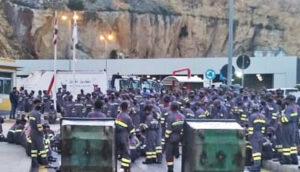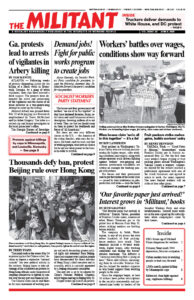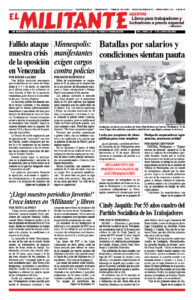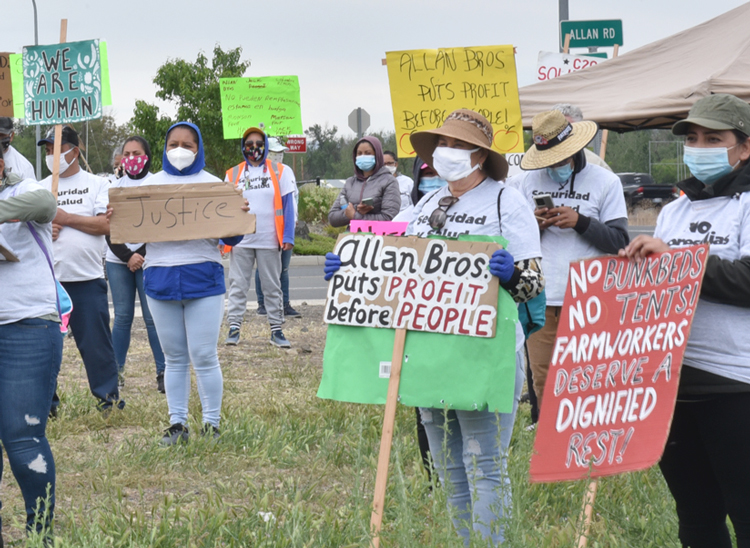Fruit packers in Washington’s Yakima Valley who are striking and protesting for higher wages, safer working conditions and respect, along with owner-operator truck drivers fighting against brokers’ rate-gouging and onerous government regulations are setting an example for working people everywhere.
The bosses and their government seek to put the burden of the social crisis — caused by their lockdowns on jobs, production and trade — onto the backs of the working class. We need to be on the job, working and joining together to fight in our defense, and in defense of all those exploited by capital.
On-the-job skirmishes, strike actions and protests, fights against brutality and killings by cops and vigilantes, and other signs of resistance by working people are growing.
As part of their endless efforts to convince us that all we can do today is retreat to our homes and stay there, bourgeois pundits have dubbed this “the age of the virus.” But that’s a lie. The problem workers face today isn’t a disease, but the growing crisis of world capitalism. And a better class of people — working people, whose labor power produces all wealth — are awakening.
From sanitation workers in New Orleans to immigrant waste collectors in Beirut, Lebanon, strikes and protests are breaking out as workers grow more determined to stand up, gaining self-confidence and class consciousness in the process.

Official unemployment figures in the U.S. — which understate the real numbers — reached 38.6 million in just nine weeks of shutdowns. That is nearly 20% overall, with youth unemployment at 32% in April. One in seven coal miner jobs has disappeared in the last three months.
Competition for markets and profits is intensifying, both among the bosses and bankers in the U.S. and between the ruling classes of rival capitalist powers worldwide.
The capitalist system’s long-term decline has been punctuated by economic crises and ever-increasing attacks on the jobs, wages and working conditions of the toilers. Mountains of debt are piling up that will lead to new crises and breakdowns. This process is fracturing the imperialist world order, put together under the bloody hegemony of the U.S. rulers after the second imperialist world war. Military tensions will grow.
They try to tell us “we’re all in this together. We all have to sacrifice.” But this is a bald-faced lie. The goal of the capitalist rulers is to press us — the working class — to sacrifice for their profits.
To engage in the dog-eat-dog struggle with their competitors, the bosses are now pushing to stoke up production and trade, reopening shuttered plants and transportation. All with one overriding thought — how to do so and maximize profits. They aim to go after our wages and conditions.
Some of the temporary shutdowns are morphing into permanent closures of firms large and small. Goodyear bosses are closing their shuttered tire plant in Alabama, throwing the last 410 workers there on the street. Among the growing numbers of companies filing for bankruptcy are the huge debt-ridden car rental firm Hertz and the former mighty retail chain J.C. Penney.
Many of the tens of millions of small-business owners of restaurants, cafes and corner stores will never reopen. Millions more furloughed workers will be out of a job.
This massive jump in unemployment is one of the central tools the bosses use to go after the working class — to promote divisions between workers with jobs and those without, to pit us against each other.
British Airways boss Willie Walsh confirmed May 25 that they plan to slash 12,000 jobs, and then ask workers to reapply and compete with each other for their jobs at half the former pay.
Many other bosses have the same idea. The New York Times reported the day before that some bosses are benevolently looking for ways not to eliminate your job by offering to let you keep working for less pay. Among those jumping on this bandwagon is HCA Healthcare, a large national hospital chain, whose bosses said that in the name of “shared sacrifice” they lowered some executive pay while cutting wages of 15,000 workers.
Governments at all levels, who’ve seen taxes plummet with the economy locked down, also like this idea. In Georgia, legislators say they either have to furlough a big clump of teachers and pre-kindergarten staff, but might instead impose a “special deduction” to keep them working the same number of hours for less pay.
For workers the answer to the bosses’ efforts to pit those working against those unemployed is to fight for more jobs, and jobs at union-scale pay. The Socialist Workers Party candidates in 2020 propose our unions fight for 30 hours work at 40 hours pay to spread jobs around without cutting our wages.
Immigrant workers hammered
Global shutdowns and spreading depression conditions have reversed the flow of immigrant workers. The oil-rich, clan-based Middle Eastern regimes are utterly reliant on paying low wages to laborers from the semicolonial world for construction and other sectors of the economy.
As many of these projects have been shuttered, hundreds of thousands now seek to return home from the United Arab Emirates, Saudi Arabia and elsewhere. In the UAE alone, where 80% of its 9 million residents are foreign-born, nearly 300,000 Indian and Pakistani workers want to leave. More than a million Filipinos working in the Gulf states are waiting to return home.
The remittances from wages these workers have relied on to send home — which reached a record $550 billion worldwide in 2019 — have disappeared. This has deepened the crisis for working people across Asia and elsewhere.
In Beirut 250 immigrant waste collectors have been on strike since April 3 demanding an end to a steep cut in pay by RAMCO, their employer. The workers, mostly from Bangladesh and India, gained national attention when they blocked garbage trucks moving in and out of RAMCO’s main waste facility May 12.
“There is no economic or social justice at all,” Bou Khater, a striking worker, told Al Jazeera May 19. “This strike shows we are at a point where this is no longer acceptable. It shows how bad the system is.”
He’s right. Workers’ battles over time will lead to growing recognition that the only answer to the devastation caused by capitalism in crisis is the road of working people taking political power into their own hands, taking control over production and over how the wealth our class produces is used, once and for all.


